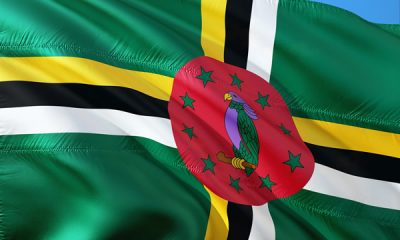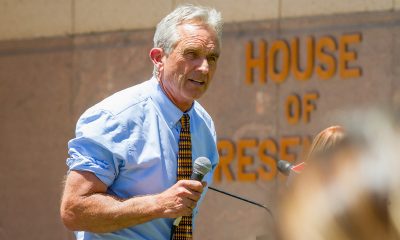World
‘I love Ukraine’
Country’s activists remain defiant as they mark war’s first anniversary
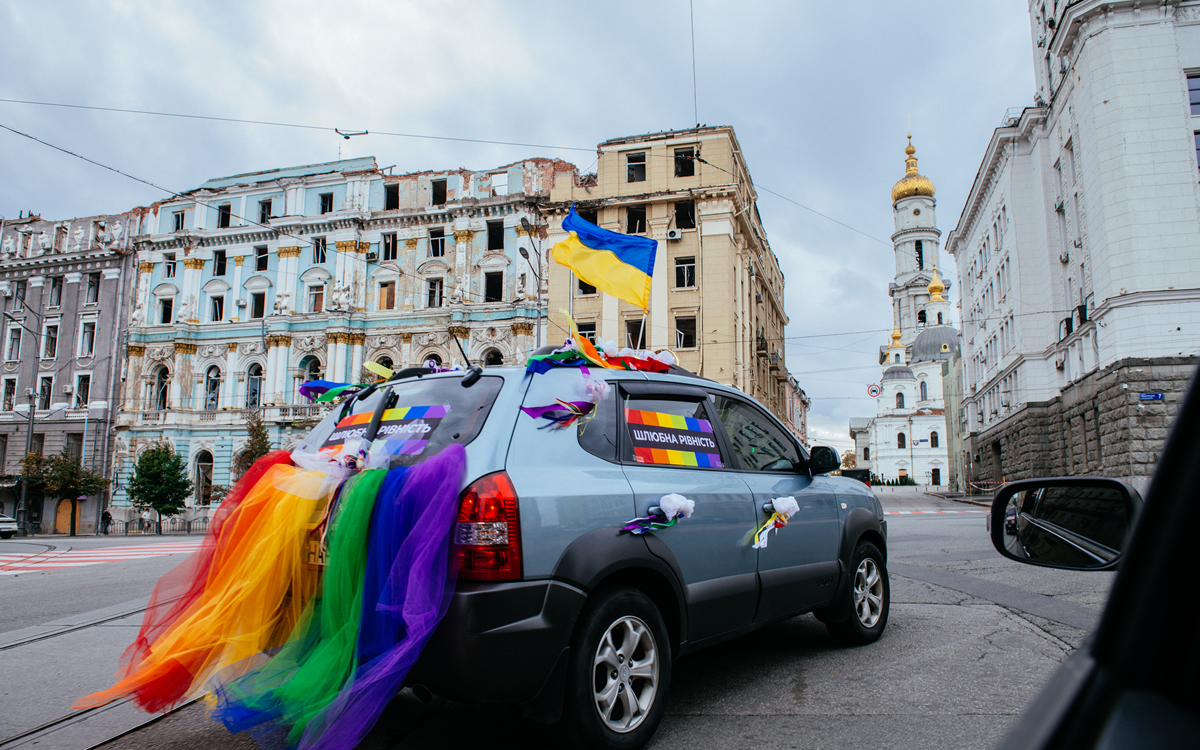
Anna Sharyhina, co-founder of the Sphere Women’s Association, a group that promotes LGBTQ and intersex rights in Ukraine, on Sept. 25, 2022, led a Pride march in a subway station in Kharkiv, the country’s second-largest city that is less than 30 miles from the Russian border in eastern Ukraine.
Kharkiv Pride took place during the Ukrainian military’s counteroffensive against Russian troops in Kharkiv Oblast. Sphere Fundraising Manager Ruslana Hnatchenko on Tuesday told the Washington Blade during a Zoom interview the subway was the only safe place for the event to happen, but she said it was “very important for us to have it in Ukraine and have it in Kharkiv.”
“Kharkiv carries a significance of being at the frontline and it is so close to Russia,” said Hnatchenko. “It was great to have it there.”
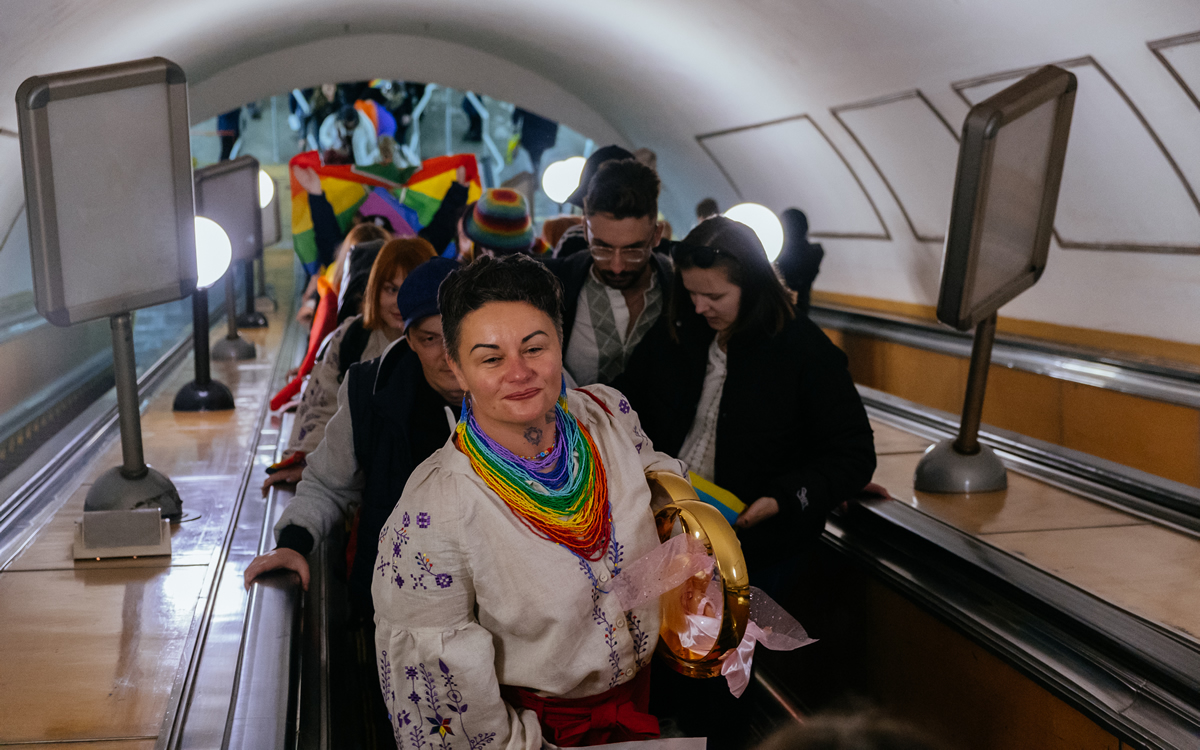
Friday marks one year since Russia launched its war against Ukraine.
Dmitry Shapoval, a gay man with HIV from Kyiv, the Ukrainian capital, and Anastasiia Baraniuk and her partner, Yulia Mulyukina, who were living together from Dniptro, a city on the Dnieper River in central Ukraine, are among the millions of people who have left Ukraine over the last year.
Hnatchenko was in Budapest, Hungary, studying for her master’s degree when the war began, and she spoke with the Blade from there. She visited her family over the Christmas holidays, but they met in Lviv, a city in western Ukraine that is close to the country’s border with Poland, because it was safer than Kharkiv.
“It was unsafe for me to come to Kharkiv,” said Hnatchenko. “It would be better for everyone to meet in the west.”
A Russian airstrike on March 1, 2022, killed Elvira Schemur, a 21-year-old law school student who was a volunteer for Kharkiv Pride and Kyiv Pride. Schemur was volunteering inside Kharkiv’s regional administration building when she was killed.
Hnatchenko said activists in Kherson, a city that Ukrainian forces liberated last November, told her Russian soldiers “were aware of where people from vulnerable groups (LGBTQ and intersex people and Roma people) lived.” Hnatchenko told the Blade people who identified as LGBTQ, intersex or nonbinary did not go outside during the occupation because they were afraid of being forcibly conscripted, attacked or sexually assaulted.
“A lot of LGBT people just tried not to go outside … and obviously not to expose anything about their identity,” she said.
Hnatchenko also told the Blade women and girls in Kherson tried to dress in a “non-attractive way” in order “to make themselves look ugly, so the troops would take less interest in them.”
‘We help our soldiers’
Activists and advocacy groups remain defiant. They also continue to support LGBTQ and intersex Ukrainians who remain inside the country and servicemembers.
Hnatchenko said Sphere has provided humanitarian assistance and psychological support to more than 1,500 people.
Outright International, RFSL (the Swedish Federation for Lesbian, Gay, Bisexual, Transgender, Queer and Intersex Rights), Hivos and private donors inside Ukraine and elsewhere have donated funds that have allowed Sphere to purchase generators, clothes and blankets that it has distributed to Kharkiv’s LGBTQ and intersex residents during blackouts that Russia’s attacks against Ukrainian infrastructure have caused.
The U.S. Agency for International Development and the President’s Emergency Plan for AIDS Relief over the last year have delivered millions of doses of antiretroviral drugs for Ukrainians with HIV/AIDS. Then-Kyiv Pride Executive Director Lenny Emson last month during a photo exhibit at Ukraine House in D.C. that highlighted Ukrainian LGBTQ and intersex servicemembers noted the organization continues to purchase basic supplies for them.
“We buy shoes. We buy underwear. We buy socks. We buy heaters,” said Emson. “We help our soldiers.”
Ukrainian President Volodymyr Zelenskyy over the last year has indicated his support of LGBTQ and intersex rights.
Zelenskyy last summer said he supports a civil partnerships law for same-sex couples.
Ukrainian lawmakers late last year unanimously approved a media regulation bill that will ban hate speech and incitement based on sexual orientation and gender identity. The measure passed days before Zelenskyy, a former actor and comedian, met with President Joe Biden at the White House and addressed Congress.
Zelenskyy last month made a broad reference to LGBTQ and intersex rights in a virtual Golden Globes appearance. Ukrainian Ambassador to the U.S. Oksana Markarova during the Jan. 26 event in D.C. applauded Kyiv Pride and other LGBTQ and intersex rights groups in her country.
“Thank you for everything you do in Kyiv, and thank you for everything that you do in order to fight the discrimination that still is somewhere in Ukraine,” said Markarova. “Not everything is perfect yet, but you know, I think we are moving in the right direction. And we together will not only fight the external enemy, but also will see equality.”
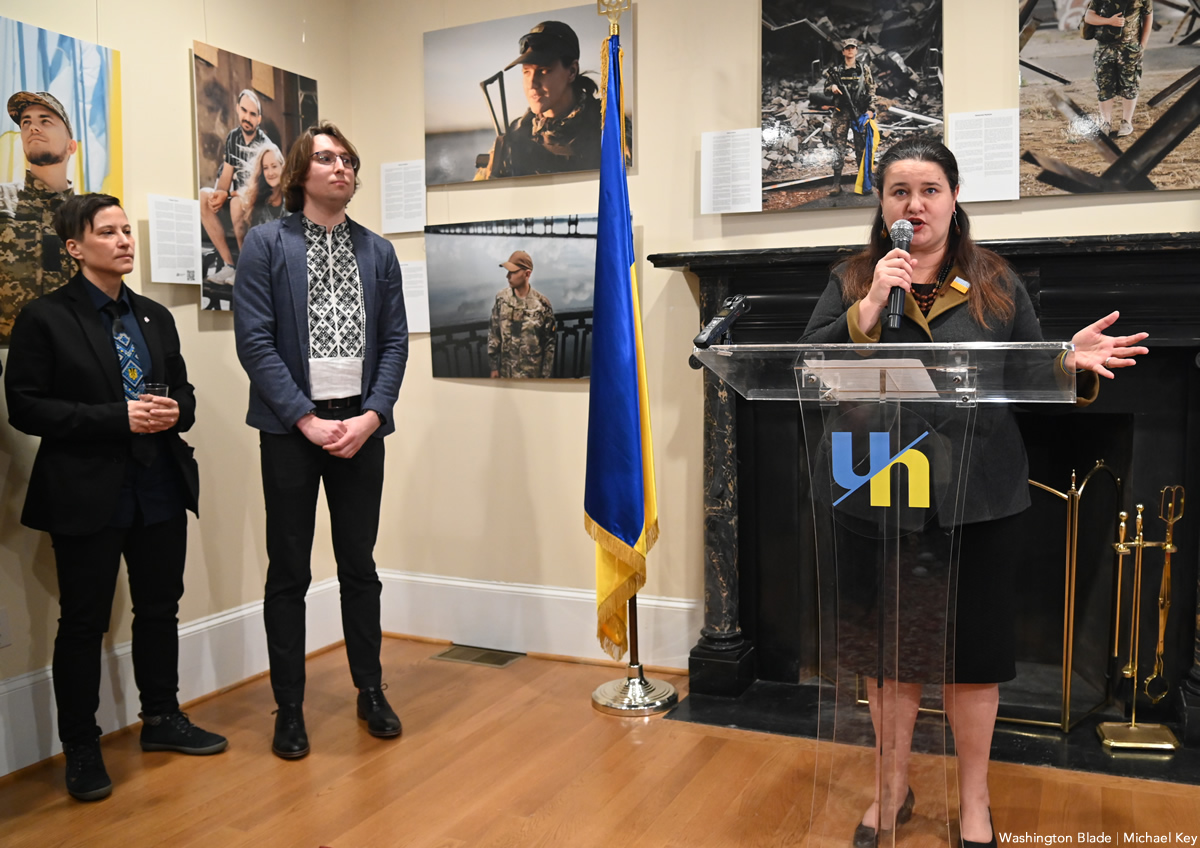
Biden on Feb. 20 met with Zelenskyy in Kyiv.
Hnatchenko told the Blade she thinks Zelenskyy “does believe in human rights.”
“Maybe he’s not a full-blown ally, yet, but I think he believes in human rights,” she said, while noting she was sharing her personal thoughts about Zelenskyy. “He’s not only doing that because of the pressure from partners, but there’s pressure from within Ukraine to not do that.”
Hnatchenko further acknowledged conservative politicians, prominent figures within the Ukrainian and Russian Orthodox Churches and many Ukrainians themselves remain opposed to LGBTQ and intersex rights.
“He (Zelenskyy) is kind of between a rock and a hard place in that sense, but I believe that human rights in Ukraine will overcome, especially after our victory,” said Hnatchenko. “We will make progress.”
Helen Globa, co-founder of Tergo, a support group for parents and friends of LGBTQ and intersex Ukrainians, on March 2, 2022, left her apartment in the Kyiv suburb of Bucha. She lived in New York with her son, Bogdan Globa, and his husband until she returned to Ukraine last August.
Helen Globa, like Hnatchenko, acknowledged many Ukrainians remain opposed to LGBTQ and intersex rights, but she said Zelenskyy’s support of civil unions for same-sex couples and LGBTQ and intersex Ukrainians in the country’s armed forces are two tangible results of activists’ work in the country. Helen Globa also said one of the reasons she decided to return to Ukraine was to continue her support of these efforts.
“I love Ukraine and my life, my activities,” she told the Blade on Wednesday. “I do believe in our victory and further opportunities to finish my LGBTQ human rights activities by pushing our government to adopt same-sex partnership and marriages.”
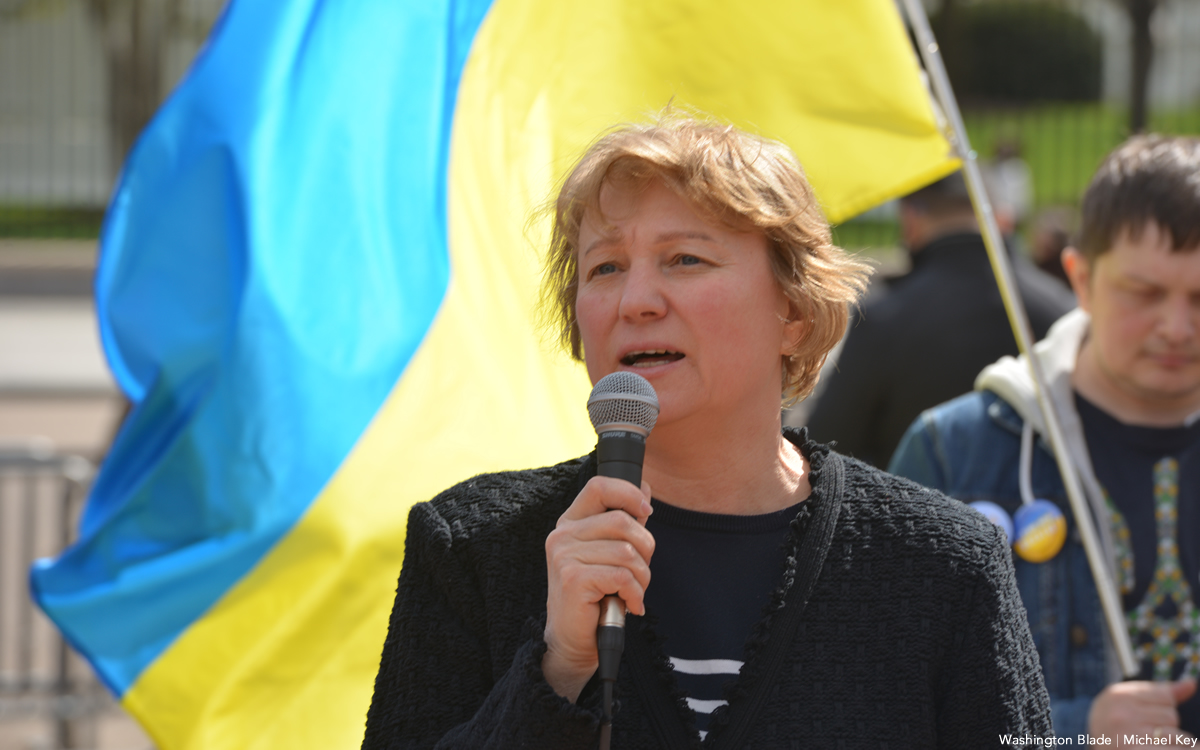
Sarah Ashton-Cirillo, a transgender woman from Las Vegas who enlisted in the Ukrainian military after she covered the war, echoed Helen Globa.
“This act of war by Putin has set in motion a timely and irreversible civil rights movement in Ukraine, one that has been extraordinarily beneficial to the LGBTQ community,” Ashton-Cirillo told the Blade on Tuesday from the frontlines where she is fighting with the 209th Battalion of the 113th Brigade in the Donbas. “From hundreds of openly queer men and women serving in the Armed Forces of Ukraine to President Zelenskyy’s positive statement about civil partnerships and human rights as applied to the community, what Putin has done has allowed freedom to bloom in Ukraine.”

The Mexican Senate on Thursday approved a bill that would ban so-called conversion therapy in the country.
Yaaj México, a Mexican LGBTQ rights group, on X noted the measure passed by a 77-4 vote margin with 15 abstentions. The Chamber of Deputies, the lower house of Mexico’s congress, approved the bill last month that, among other things, would subject conversion therapy practitioners to between two and six years in prison and fines.
The Senate on its X account described conversion therapy as “practices that have incentivized the violation of human rights of the LGBTTTIQ+ community.”
“The Senate moved (to) sanction therapies that impede or annul a person’s orientation or gender identity,” it said. “There are aggravating factors when the practices are done to minors, older adults and people with disabilities.”
Mexico City and the states of Oaxaca, Quintana Roo, Jalisco and Sonora are among the Mexican jurisdictions that have banned the discredited practice.
The Senate in 2022 passed a conversion therapy ban bill, but the House of Deputies did not approve it. It is not immediately clear whether President Andrés Manuel López Obrador supports the ban.
Canada, Brazil, Belgium, Germany, France, and New Zealand are among the countries that ban conversion therapy. Virginia, California, and D.C. are among the U.S. jurisdictions that prohibit the practice for minors.
South America
Argentina government dismisses transgender public sector employees
Country’s Trans Labor Quota Law enacted in 2021

Protests have broken out across Argentina in recent weeks after the dismissal of transgender people from their government jobs.
President Javier Milei’s action is in stark contract with the progress seen in 2023, where the government’s hiring of trans people increased by 900 percent within the framework of the Trans Labor Quota Law that had been in place since 2021.
Among those affected is Sofia Diaz, a “survivor” who shared her testimony with the Washington Blade hours after she traveled from Chaco Province to Buenos Aires to protest her dismissal.
Presentes, an LGBTQ news agency, reported the government dismissed more than 85 trans employees in less than two weeks.
Diaz, 49, holds a degree in combined arts. She joined the National Social Security Administration (ANSES) in 2022 under the Trans Labor Inclusion Law. The layoffs began in January and left many people feeling uncertain and anguished. It was her turn a few days ago.
Diaz in an interview recounted how the situation became progressively more complicated, with difficulties in accessing information about her employment status and the eventual confirmation of dismissals through WhatsApp messages. This government action, according to Diaz, violates the law.
“We were on a Friday, I think on March 24, in the office and we have a WhatsApp group of other colleagues from all over Argentina who entered through the trans labor quota and they tell us if we can get our pay stubs on the intranet,” Diaz recalled. “So, I tried to enter, I could not, I talked to two other colleagues and they told me no, they could not, and so we went to another person. He couldn’t either.”
“Some people told us that it could be a system error. Well, we were never calm, let’s say not how this issue of installing fear and the perversion with which they do it ends,” she added. “This sadism of … inflicting pain and speculating with your misfortune and so on … is something that characterizes Javier Milei’s government.”
Diaz recalled a list of those dismissed from the agency began to circulate from the union in the afternoon. A colleague passed it on to her, “and well, unfortunately I was also on that list.”
“At that moment the whole weekend went by with anguish, crying, and talking with other colleagues from other places, not only trans, but everyone, everyone and everyone,” she said. “On Monday when we went to try to enter, we could not enter with the biometric, which is the thumb we had to use every morning to enter.”
Despite the difficult moment through which she is going, the trans activist stressed to the Blade that she will continue protesting and will even sue the government because her dismissal is illegal and “violates the constitution itself.”
The LGBTQ community and its allies have mobilized and organized demonstrations, highlighting the importance of defending the rights won and fighting against discrimination and exclusion. Diaz emphasized the fight is not only for the people affected today, but also for future generations, saying the historical memory of the struggles for inclusion and social justice must be kept alive.
“The Argentine government thus faces a key challenge in human and labor rights, where public pressure and social mobilization can play a determining role in protecting the rights of LGBTQ+ people,” Diaz said.
Africa
For queer Nigerians, being on gay dating apps is still a risk
Homophobes target users for violence

Gay hookup apps like Grindr, and dating apps like Tinder and Bumble have managed to proliferate queer communities in countries like Nigeria.
Those who seek one night stands find what they want while those looking for love equally find what they seek. These platforms have managed to position themselves as safe spaces for queer people in anti-gay Nigeria. In recent times, however, it is proving to be unsafe, as homophobic people are quickly learning about the apps, and opening accounts that either seek to outrightly threaten queer people, or pretend to be queer, have long chats with gay people, invite them over, and inflict violence on them.
Take the case of Biodun, a queer Nigerian man who joined Grindr to meet up with guys like him.
After Biodun had built a connection and agreed to meet with someone whose display name was “Mamba,” they decided to meet up only for him to be met with violence. Apparently, Mamba ran a catfish account.
“I’ll never forget that day,” Biodun, who asked the Washington Blade not to use his last name because of safety concerns, said. “I still think about it, and sometimes blame myself for being very careless, even though Grindr was supposed to be our safe space.”
Biodun’s experience isn’t peculiar to him.
In Nigeria, draconian laws that criminalize same-sex relationships exist, making queer people turn to the digital realm to explore their identities and seek connections beyond the confines of societal oppression that comes with the physical environment. Gay dating apps such as Grindr, therefore, have emerged as virtual sanctuaries, offering spaces for queer Nigerians to forge friendships, find solidarity, and pursue romantic or sexual relationships. Spaces like this, however, have morphed into a landscape fraught with danger, as homophobic people have weaponized these platforms to perpetuate hate and violence.
“Sometimes, I often wonder how they learned about these platforms,” Daniel, which is not his real name, told the Blade. “You would think that it is just us in the platforms, until you find out that the accounts are rooted in homophobia.”
One time, someone’s bio read, “I’m only here to deal with the gay people. I know all of you, and I will find and kill you. We no want una for here (translates to we do not want you here, in English.)” It was a stark reminder that these spaces are no longer LGBTQ-friendly for Nigerians. In 2014, there was the passage of the Same-Sex Marriage Prohibition Act by former President Goodluck Jonathan, which not only criminalized same-sex unions, but also imposed severe penalties on anyone involved in LGBTQ advocacy or support.
This law catalyzed a surge in discrimination and violence against queer Nigerians; emboldening regular civilians, religious extremists, and even law enforcement agencies to target individuals perceived as deviating from traditional gender and sexual norms. Again, amid this hostile environment, gay dating apps emerged as lifelines for many queer Nigerians, offering avenues for discreet communication, community building, and the pursuit of intimate relationships.
The very anonymity and freedom these apps provided, however, became double-edged swords.
The advent of screenshot and screen-recording capabilities on these apps, for example, reduced the risks of exposure, strengthening the safety and privacy of users. However, this also comes with its own lapses, as queer people using Grindr have often relied on screenshots and screen recordings to confirm the identities of potentials with their friends, before accepting to meet.
“Before the removal of the screenshot option, I usually shared photos of others with my trusted friends,” Biodun shared. “But since that was taken off, there was no way for me to do that.”
Although, according to Grindr’s terms and conditions, the removal came with privacy concerns, as it was to facilitate a safe dating experience.
This erosion of digital safe spaces is depriving queer Nigerians of vital avenues for self-expression and affirmation,and is exacerbating the psychological toll of living in a society that continues to systematically demonize their identities. Moreover, the normalization of homophobic rhetoric and violence in both physical and digital realms has perpetuated a cycle of fear and oppression, and is reinforcing this notion that LGBTQ individuals are inherently unworthy of dignity and respect. Despite these challenges, though, the resilience of queer Nigerians continue to persist, as they defy societal norms and assert their right to love and be loved.
-

 State Department3 days ago
State Department3 days agoState Department releases annual human rights report
-

 South America1 day ago
South America1 day agoArgentina government dismisses transgender public sector employees
-

 Maryland5 days ago
Maryland5 days agoJoe Vogel campaign holds ‘Big Gay Canvass Kickoff’
-

 District of Columbia1 day ago
District of Columbia1 day agoCatching up with the asexuals and aromantics of D.C.

